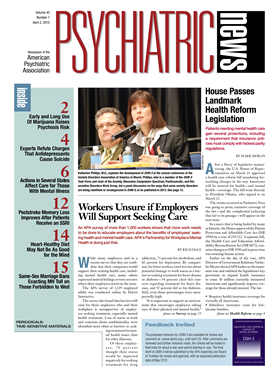While many employees said in a recent survey that they are confident that their companies would support their seeking health care, including mental health care, many others expressed neutral feelings or were not sure where their employers stood on the issue.
The APA survey of 1,129 employed adults was conducted online by Harris Interactive.
The survey also found that barriers still exist for those employees who said their workplace is unsupportive of employees seeking treatment, especially mental health treatment. Loss of status at work and concerns about confidentiality were identified more often as barriers to seeking treatment for mental health issues than for other illnesses.
Of these employees, 76 percent thought their status would be impacted negatively for seeking treatment for drug addiction, 73 percent for alcoholism, and 62 percent for depression. By comparison, far fewer workers cited worries about potential damage to work status as a barrier to seeking treatment for heart disease or diabetes—54 percent cited this concern regarding treatment for heart disease, and 55 percent did so for diabetes. Still, even those percentages were unexpectedly high.
“It is important to support an environment that encourages employees taking care of their physical and mental health,” said Alan Axelson, M.D., chair of APA's Partnership for Workplace Mental Health Advisory Council. “Research supports the fact that when people receive needed care, they are healthier and more productive—and employers realize the return on their health care investment.”
Specifically, the survey found that from 42 percent to 48 percent of respondents believe that their employer is supportive or extremely supportive of their seeking care for health issues overall, depending on which of five major illnesses they were asked about. But over half of the respondents said they viewed their employer as either neutral on their seeking needed care or were not sure where their employer stood on this issue.
Regarding mental health care, 45 percent believed that their employer would support their seeking care for depression, while just 7 percent said that their employer would not support their seeking such care. Similarly, 43 percent indicated that their employer would support their seeking treatment for alcoholism, compared with 8 percent who thought their employer would look askance at their seeking such care. A similar percentage, 42 percent, thought their employer would support treatment for drug use, while 9 percent thought their employer would be unsupportive of seeking such care.
The Partnership for Workplace Mental Health, a program of the American Psychiatric Foundation, works with companies to promote the business case for quality mental health care, including early recognition, access to care and effective treatment.
In announcing the results of the survey, the partnership offered suggestions to employers “to implement policies that support workers who believe they may need mental health care and to lower barriers to their workers' obtaining such care,” said Axelson.
Among the suggestions to employers were to remind employees of the health benefits and programs available to them and how to access these services; promote prevention, early intervention, and wellness programs; remind employees about the ways that their privacy is protected when they utilize services—which is especially important if workers are concerned about seeking mental health care; and discourage people from working while ill and assure employees that they are wanted back safe, healthy, and productive.
Workers' views on their employers' support for medical care come as more workers may have access to mental health care following the implementation of the 2008 federal mental health parity law, which requires health insurance plans that offer mental health or substance use treatment benefits to offer them with the same limits and at the same levels as other medical benefits.
Workers' beliefs about how their employers view their seeking mental health treatment also could have a big impact on businesses' bottom lines. The annual economic, indirect cost of mental illnesses in the United States is estimated at around $79 billion, and most of that amount, about $63 billion, stems from the cost of lost workplace productivity, according to the 2003 report of the President's New Freedom Commission on Mental Health.
